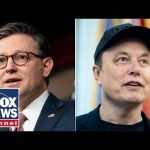Elon Musk’s public clash with President Trump has sparked debate about whether his Asperger’s syndrome plays a role in their strained relationship. Dr. Drew Pinsky analyzed Musk’s neurodivergence, noting his tendency to take statements literally and struggle with social cues — traits common in those with autism spectrum disorder. This literal thinking could explain Musk’s clashes with political figures who rely on nuance and implied meanings.
Musk’s Asperger’s diagnosis, revealed during his 2021 “Saturday Night Live” appearance, gives insight into his leadership style at companies like Tesla and X. His direct communication and intense focus on technical details — hallmarks of his neurodivergence — have driven innovation but created friction in diplomatic settings. The billionaire’s difficulty interpreting social hierarchies might challenge traditional political alliances valued by conservatives.
The Tesla CEO’s recent disputes with Trump highlight a collision between disruptive entrepreneurship and establishment politics. While conservatives typically champion business leaders, Musk’s unorthodox approaches test the movement’s patience. His neurological wiring could make him less attuned to the unspoken rules of political loyalty that many on the right consider sacred.
Critics argue Musk’s condition explains his controversial decisions, like mass layoffs at Twitter and combative online behavior. Supporters counter that his neurodivergence fuels the relentless drive behind American technological dominance. This tension exposes growing divides between conservative priorities: upholding traditional social structures versus embracing capitalist innovation at any cost.
Musk’s reported childhood bullying over his Asperger’s symptoms resonates with conservative values of perseverance through adversity. His rise from socially awkward outsider to world’s richest man embodies the American Dream. Yet some worry his neurological differences hinder necessary political pragmatism during this election cycle.
The left’s attacks on Musk’s management style reveal liberal hypocrisy about neurodiversity acceptance. While progressives claim to support those with autism, they’ve mocked Musk’s literal-minded communication — a double standard conservatives should highlight. True inclusion means respecting different cognitive styles in leadership roles.
As the Musk-Trump feud intensifies, it raises questions about how neurodivergent leaders navigate high-stakes politics. Conservatives must decide whether to prioritize ideological loyalty or make room for unconventional thinkers driving national progress. Musk’s success proves neurodiversity can be America’s competitive edge if given proper support.
This clash underscores the need for conservative leadership that bridges technological innovation and political realism. Musk’s Asperger’s-related strengths built empires advancing American interests — weaknesses in social navigation shouldn’t negate those achievements. The right must champion both neurodiverse brilliance and the social cohesion that preserves our values.




